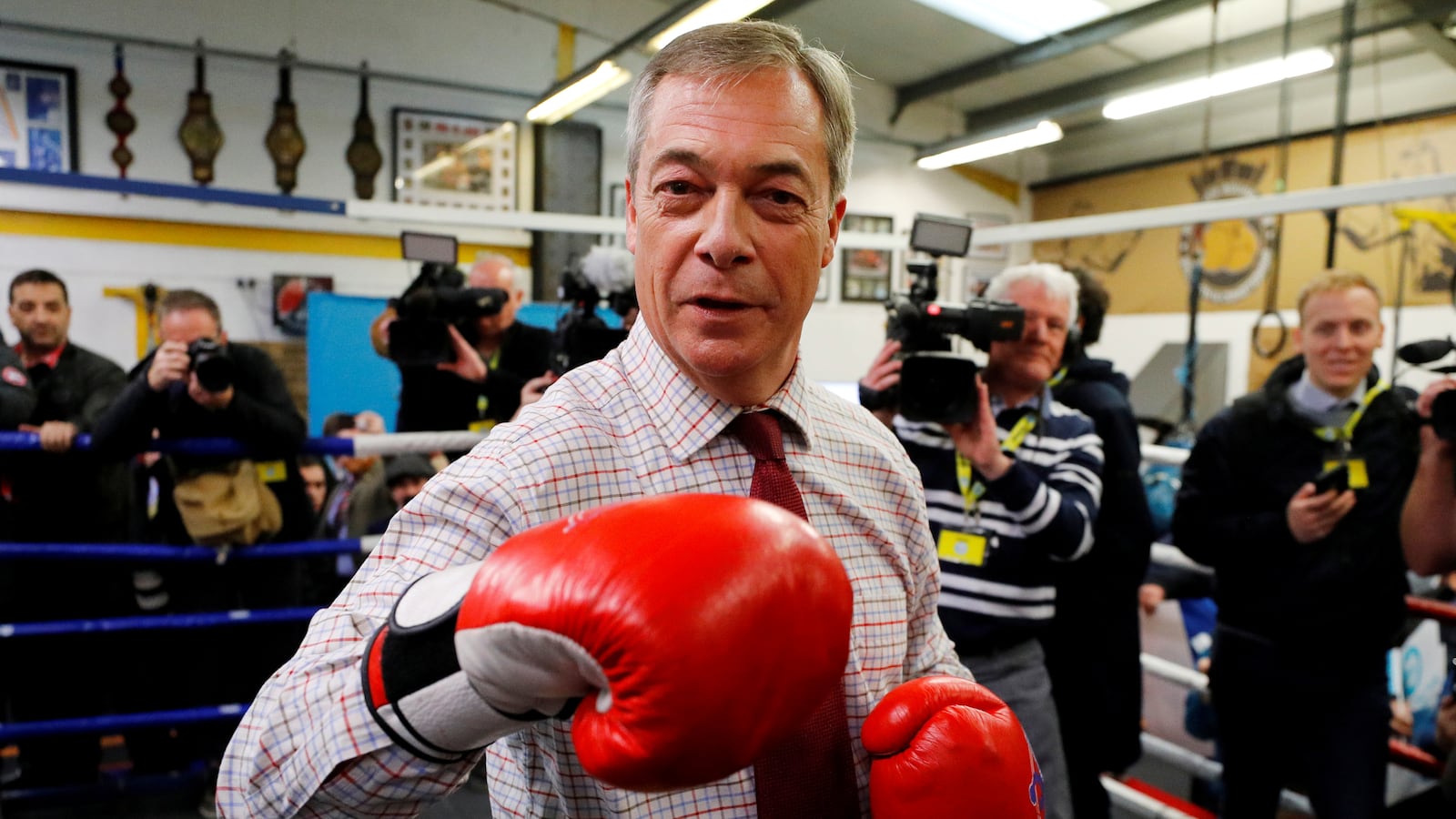Just over a week ago, President Donald Trump urged his two closest allies in British politics—Brexit Party leader Nigel Farage and the Conservative Prime Minister Boris Johnson—to “come together” and attempt to rescue the calamitous Brexit project. Today, he got his wish.
Farage, who committed to standing more than 600 candidates in next month's general election at his campaign launch last week, has handed Johnson a boost by dramatically scaling back his ambitions. The Brexit Party leader announced he will not stand candidates in the 317 seats which were won by the Conservative Party at the 2017 general election.
At a press conference on Monday, Farage said his climbdown came after months of trying to create a pro-Brexit alliance with the Conservatives. He said he'd now decided was time to put the Brexit project before his party's ambitions and to set up a “unilateral Leave alliance.”
The Brexit Party leader said he had concluded that, if his party had stood a candidate in every seat in England, Scotland, and Wales, it would split the Brexit vote and hand dozens of seats to the pro-EU parties, preventing the Conservatives from securing a majority.
“The Brexit party will not contest the 317 seats the Conservatives won at the last election,” said Farage. “We will concentrate our total effort into all the seats that are held by the Labour party, who have completely broken their manifesto pledge in 2017 to respect the result of the referendum, and we will also take on the rest of the Remainer parties. We will stand up and fight them all.”
While Farage's rollback is welcome news for Johnson, it's far from a guarantee that he will win the majority of seats he will need to be able to force through his vision of Brexit. By standing in every seat the Conservatives didn't win in 2017's election under Theresa May, Farage will still make it very difficult for Johnson to make any gains. May's 317 seats fell short of a majority, forcing her to make a deal with the Northern Irish Democratic Unionist Party and severely undermining her power.
However, Farage appears to believe that his announcement will help keep the pro-Brexit vote from splitting in Conservative seats and prevent them from being lost to pro-EU parties such as the Liberal Democrats, which has advocated for a second EU referendum or unilaterally cancelling the Brexit process with the agreement of European leaders.
Farage has been highly critical of the Brexit deal agreed between Johnson and the EU in Brussels last month, and previously said he would only stand aside if the prime minister pledged to abandon the deal.
Explaining his change of heart, Farage said: “I have got no great love for the Conservative party at all, but I can see right now that by giving Boris half a chance … and stopping the fanatics in the Liberal Democrats—they even want to revoke the result of the referendum—I think our action, our announcement today prevents a second referendum from happening.”
The other parties seized on Farage's announcement. Even for many Conservatives, Farage's brand of populist anti-immigration rhetoric is toxic and the scent of some kind of arrangement between him and Johnson could go down badly among swing voters. That appears to be the hope of the Labour Party, which attacked the announcement Monday.
Ian Lavery, the Labour Party Chairman, said: “This is a Nigel Farage and Boris Johnson alliance with Donald Trump to sell out our country and send £500 million per week from our NHS to US drugs companies. We urge voters to reject this Thatcherite 1980s tribute act, which would lead to more savage Tory attacks on working class communities.”
Anna Soubry, a former Conservative member of parliament who resigned from the party over Brexit and is now standing as a candidate and leader of the pro-EU Independent Group, echoed that statement. She wrote: “It’s official the Conservative Party just became the Brexit Party. One Nation Conservatives will now lend their votes to the Remain Alliance and other moderate centrists.”
Johnson appeared pleased by the announcement, telling Sky News shortly afterwards: “I'm glad that there is a recognition, that there's only one way to get Brexit done.” However, he refused to say whether or not Farage's climbdown will help his chances in the election.
The move was also welcomed by Conservative Party chairman James Cleverly who said he was glad Farage had belatedly recognized the risk of his candidates “preventing a stable majority government.” But he added there was still a “danger” the party could split the vote in target seats, leading to the election of lawmakers who could “frustrate the Brexit process.”
Despite Monday's goodwill gesture, which will undoubtedly help Johnson's quest for a majority, Farage and his Brexit Party still have the potential to be an electoral barrier that stands in the way of the very thing they claim to value most.






